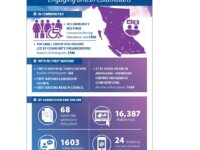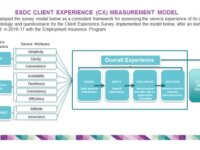Converlens emerged from the Australian government’s 2017/18 Business Research and Innovation Initiative (BRII) "Digitally enabled community engagement in policy and programme design" challenge. The BRII challenge linked into OGP Australia’s first National Action Plan. Deploying artificial intelligence (AI) to provide a smart layer of qualitative natural-language processing techniques (NLP), Converlens assists people in government to excel at managing the submissions and communications…
Innovation Tag: Citizen Engagement
Case Study
Redesigning the federal homelessness program: engaging people with lived experience of homelessness
As part of the engagement process on the redesign of Canada’s homelessness program, Employment and Social Development Canada engaged directly with people with lived experience of homelessness. Dedicated tools and mechanisms were developed to ensure the meaningful participation of people with lived experience, the removal and mitigation of financial barriers to engagement and recognition of the unique expertise and knowledge of people with lived experience.
Case Study
Engaging People with Lived Experience of Poverty to Build and Implement British Columbia’s First…

In 2016, British Columbia (B.C.) had the second highest poverty rate in Canada but was the only province without a poverty reduction strategy. To inform its first strategy, a new government completed the most extensive poverty engagement to date in Canada, focusing on people with lived experience of poverty.
To address barriers, B.C. used a range of innovative engagement approaches including direct supports for participants, dedicated Indigenous engagement and funding grants to non-profits.
Canada has an obligation to protect and inform migrant workers of their rights while in Canada and to support employer compliance with the conditions of its Temporary Foreign Worker Program. To this end, it launched the Migrant Worker Support Network pilot initiative. The Network is a collaborative and migrant worker-informed platform for migrant workers, employers, governments, and civil society to develop and implement solutions to better protection and support of migrant workers in Canada.
Employment and Social Development Canada (ESDC) led the design and implementation of a national poverty reduction strategy public engagement process. We offered Canadians multiple ways to share their views, from public town hall events to online discussions, to a youth contest, to an in-depth research project. The engagement process successfully reached thousands of Canadians in a short time frame on a low budget. The plan is now used as a Government of Canada model for effective civic…
In June 2017 the Government created a Social Innovation and Social Finance Strategy Co-Creation Steering Group (SG) to provide recommendations for a Strategy. Based on a year-long process the SG developed 12 recommendations.
In response, the Government announced the Strategy’s foundational elements in November 2018 including a $50 million Investment and Readiness program to build the capacity of organization to access social finance and a $755 million repayable Social Finance Fund.
The Client Centric Policy Playbook strengthens the ability to engage clients in the design of program and service policies.
Through extensive engagement with policy experts and employees on-the-ground, the Playbook has brought together innovative best practices, tools and resources for engaging clients.
This solution enhances client experience by giving clients an opportunity to be part of the policy generation process and by ensuring that programs and services are reflective of their needs.
Case Study
Future Skills: Engaging governments and stakeholders to build a skills development ecosystem
Future Skills is part of the Government’s plan to build a resilient and confident workforce that reflects Canada rapidly evolving nature of work. It embraces user-centred design principles to inform the adoption of proven practices and evidence on skills development approaches, to ensure that Canada’s policies and programs are prepared to meet Canadians’ changing needs. It was designed in collaboration with provincial and territorial governments, and informed by a large range of…
The Client Experience Measurement Survey Model was developed by Employment and Social Development Canada to gather and analyse client feedback to improve service delivery to its clients. Canadians have been able to express their views on government programs and services, which have informed the way programs and services are designed and delivered. The survey allows the tracking of service satisfaction, ease of access, effectiveness of service delivery, and the experience of particular programs…
The Indigenous Early Learning and Child Care (ELCC) Framework is innovative because it represents a promising practice in the development of a comprehensive policy, program and implementation strategy that was co-developed with the Government of Canada and Indigneous peoples. The document recognizes the value of Indigenous-led, culturally-grounded programs and that supports their health and wellbeing, spiritual, social and educational development, and language and culture.


